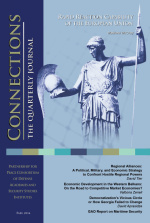Georgia’s first peaceful transition of power, through the parliamentary elections in 2012, has been celebrated as an important achievement in the democratization of the country. At the same time, the new government has initiated several high-profile criminal cases against representatives of the former government, including the president and the prime minister, creating solid bases for critical assessment of further prospects for the democratic consolidation of Georgia. The new government has signed an Association Agreement with the EU – an important test to prove Georgia’s pro-Western orientation and dismantle speculations about pro-Russian sentiments of the new ruling elite. Nevertheless, how the political change in leadership might impact the external relations of Georgia remains to be seen.
Democratization’s Vicious Circle or How Georgia Failed to Change
Article statistics
Bibliography
Fairbanks, Jr., Charles H., and Alexi Gugushvili. "A New Chance for Georgian Democracy." Journal of Democracy 24, no. 1 (2013): 116-127.
Fairbanks, Jr, Charles H.. "Georgian Democracy: Seizing or Losing the Chance?" Journal of Democracy 25, no. 1 (2014): 154-165.
Nodia, Ghia, and Alvaro P. Scholtbach. The Political Landscape of Georgia. Political Parties: Achievements, Challenges and Prospects. Delft, The Netherlands: Eburon, 2006.
Wheatley, Jonathan. Georgia from National Awakening to Rose Revolution: Delayed Transition in the Former Soviet Union. Burlington: Ashgate, 2005.
Atilgan, Canan, and David Aprasidze. "End to an Era: Transfer of Power in Georgia." KAS International Reports 12 (2013): 69-88.
Bendavid, Naftali. "Georgia Charges Against Former President Put EU in Delicate Spot." The Wall Street Journal (2014).
PM on His Intended Pre-Term Resignation In Ivanishvili’s open letter to the public is available in an unofficial translation. Civil Georgia, 2013.
Moore, Mick. "Revenues, State Formation, and the Quality of Governance in Developing Countries." International Political Science Review 25, no. 3 (2004): 297-319.
Rosser, Andrew. The Political Economy of the Resource Curse: A Literature Survey In Working paper. Brighton: Institute of Developments Studies, 2006.
Ivanishvili, Bidzina. The World’s Billionaires. Forbes, 2014.
Gross Domestic Product (GDP) of Georgia. National Statistics Office of Georgia, 2014.
Huber, Evelyne, Dietrich Rueschemeyer, and John D. Stephens. "The Paradoxes of Contemporary Democracy: Formal, Participatory, and Social Dimensions." Comparative Politics 29, no. 3 (1997): 323-342.
Parliament Adopts Bipartisan Resolution on Foreign Policy. Civil Georgia, 2013.
Cited In
Cavoukian, Kristin. Identity Gerrymandering: How the Armenian State Constructs and Controls “Its” Diaspora In Department of Political Science. Vol. degree of Doctor of Philosophy. Toronto: University of Toronto, 2016.

